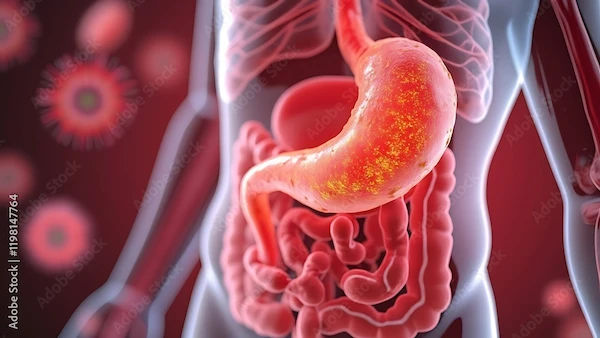How to Reduce Acidity Naturally: Effective Remedies and Lifestyle Changes
Discover effective natural remedies and lifestyle changes to reduce acidity and improve digestion. Learn how to manage acid reflux with simple diet tips and home remedies.

Written by
Last updated on 3rd Jul, 2025
Introduction
Acidity – whether it’s a burning sensation in your chest or that uncomfortable feeling of acid rising in your throat – is something many of us experience from time to time. For some, it’s a frequent issue that can be both frustrating and painful. While there are medications that can help, many people are turning to natural remedies and lifestyle changes for relief. If you’re dealing with acidity and want to reduce your reliance on medications, the good news is that there are plenty of ways to manage and alleviate symptoms naturally. By making a few key changes, you may find that your symptoms improve significantly.
In this article, we’ll talk about practical and simple steps you can take to reduce acidity, with a focus on diet, herbal teas, and lifestyle adjustments. By making a few key changes, you may find that your symptoms improve significantly.
What Exactly Is Acidity?
First things first, it’s important to understand what acidity actually is. Acidity, or acid reflux, happens when the stomach acid escapes into the oesophagus. This occurs when the lower esophageal sphincter (LES) doesn’t function properly, allowing acid to travel upwards. The result? That burning feeling is known as heartburn.
You might experience acidity as:
A sour taste in your mouth
A burning sensation in your chest (heartburn)
A sensation of food getting stuck in your throat
Bloating and discomfort
It can be caused by a variety of factors, including poor diet, stress, and certain foods. Luckily, most cases of mild acidity can be managed through natural methods.
Consult Top General Physicians
Adjusting Your Diet to Manage Acidity
What you eat plays a big role in how much stomach acid you produce. By tweaking your diet, you can reduce your chances of experiencing acidity and prevent flare-ups.
1. Avoid Foods That Trigger Acidity
Some foods can irritate your stomach and increase acid production. Here’s a list of common offenders:
Citrus fruits like oranges, lemons, and grapefruits
Tomatoes and tomato-based sauces
Spicy and fatty foods
Chocolate and mint
Coffee, caffeinated drinks, and fizzy sodas
Cutting back on or eliminating these foods can make a noticeable difference. Instead, opt for foods that are gentler on the stomach.
2. Increase Alkaline Foods
Alkaline foods help balance out stomach acid and can soothe the digestive tract. Some of the best options include:
Leafy greens (e.g., spinach, kale)
Bananas and melons
Oats and whole grains
Root vegetables like sweet potatoes
These foods are naturally less likely to trigger acidity, and they’re packed with nutrients that promote better digestion. The reason alkaline foods help is that they neutralize excess acid, easing the discomfort of heartburn and promoting better overall digestion.
3. Smaller, More Frequent Meals
Rather than eating large meals, try eating smaller portions throughout the day. Overeating can overload your stomach, causing acid to spill into the oesophagus. Smaller meals are easier for your digestive system to handle and can help reduce acidity.
Herbal Teas and Remedies to Soothe Acidity
Herbal teas are a fantastic way to naturally soothe acidity. Certain herbs have anti-inflammatory properties that help calm your stomach and reduce acid production.
1. Ginger: A Natural Anti-Inflammatory
Ginger is widely known for its anti-inflammatory properties and its ability to promote digestion. It can help calm an upset stomach and reduce acidity. You can brew a cup of ginger tea by boiling a few slices of fresh ginger in water for about 10 minutes. Drink it after meals to aid digestion and reduce symptoms.
2. Chamomile Tea: Relaxing and Soothing
Chamomile is not only relaxing but also helps to ease inflammation in the stomach. It’s especially useful for people who suffer from acidity at night. Drinking chamomile tea before bed can help calm your digestive system and improve sleep quality.
3. Licorice Root Tea: Protecting the Stomach Lining
Licorice root is another excellent herb for reducing acidity. It helps protect the lining of the stomach and oesophagus, reducing irritation caused by excess acid. You can find licorice root in tea bags or take it in supplement form. Just be sure to avoid prolonged use, as it can affect blood pressure.
4. Slippery Elm: Gentle on the Digestive System
Slippery elm is a soothing herb that forms a gel-like substance when mixed with water. This helps coat the stomach and oesophagus, providing protection from stomach acid. You can find slippery elm in powder form and mix it with warm water for relief.
5. Fennel Seeds: Soothing and Digestive
Fennel seeds are a great natural remedy for acidity. They help relax the muscles in the gastrointestinal tract, reducing bloating and acidity. You can chew a few fennel seeds after meals or brew them into a tea to aid digestion and calm the stomach.
Simple Lifestyle Habits for Acidity Relief
Acidity isn’t just about what you eat – your overall lifestyle plays a key role in preventing and managing it.
1. Drink Plenty of Water
Staying hydrated is essential for digestive health. Water helps dilute stomach acid and flush out toxins. Try to drink at least eight glasses of water a day. However, avoid drinking too much water during meals, as this can put pressure on your stomach and worsen acidity.
2. Don’t Eat Before Bed
Eating right before bed increases the likelihood of experiencing acid reflux while you sleep. The best rule of thumb is to stop eating at least two to three hours before lying down. This gives your body time to digest food properly and prevents acid from rising into the oesophagus while you sleep.
3. Exercise Regularly
Regular physical activity can help keep your digestive system functioning smoothly. Exercises like walking, swimming, and yoga can reduce stress, improve digestion, and reduce the chances of acid reflux. However, avoid intense physical activity immediately after meals, as it can exacerbate symptoms.
4. Manage Stress
Stress is a major contributor to acidity. When we’re stressed, our bodies produce more acid, which can lead to reflux. Finding ways to manage stress can make a huge difference in your acidity levels. Consider incorporating relaxation techniques such as meditation, yoga, deep breathing, or even a simple daily walk to reduce stress.
Probiotics and Gut Health
A healthy gut is essential for managing acidity. Probiotics, the good bacteria that live in your digestive tract, can help improve digestion and reduce acid reflux. Foods like yogurt, kefir, sauerkraut, and kimchi are excellent sources of probiotics.
Probiotics help balance the gut microbiome and promote better digestion. Adding these foods to your diet regularly can support overall digestive health and help keep acidity in check.
Natural Supplements to Consider
If dietary changes and lifestyle habits aren’t enough, certain natural supplements may help provide additional relief from acidity.
1. Apple Cider Vinegar
While it may seem odd, apple cider vinegar can actually help reduce acidity for some people. It’s believed that vinegar helps balance stomach acid levels. Try diluting one to two teaspoons of apple cider vinegar in a glass of water before meals. However, if you have a sensitive stomach, start with a small amount.
2. Aloe Vera Juice
Aloe vera juice has anti-inflammatory properties that can help soothe the digestive tract. Drinking a small amount of aloe vera juice before meals can help reduce inflammation and alleviate acidity symptoms.
3. Magnesium
Magnesium plays a key role in digestion and acid regulation. Magnesium-rich foods, such as leafy greens, nuts, and seeds, can help reduce symptoms of acid reflux. If you don’t get enough magnesium from your diet, supplements may also be an option.
When to Seek Medical Help?
While natural remedies can be effective, it’s important to consult a doctor if you experience frequent or severe acidity. If left untreated, chronic acid reflux can cause damage to the oesophagus, leading to more serious conditions. A healthcare professional can help determine the underlying cause and recommend the appropriate treatment.
Conclusion
Managing acidity naturally involves a combination of diet, lifestyle changes, and simple remedies. By making small adjustments to what you eat, how you live, and how you manage stress, you can significantly reduce the discomfort caused by acidity. While these natural remedies can be very effective, it’s always a good idea to consult a healthcare professional if symptoms persist or worsen.
By taking a proactive approach, you can regain control of your digestive health and enjoy life without the constant discomfort of acidity.
Consult Top Gastroenterologist
Consult Top General Physicians

Dr. Karan Goel
General Physician/ Internal Medicine Specialist
11 Years • MBBS, MD (Paediatrics)
Kolkata
Little Steps Clinic, Kolkata

Dr. Mijanur Rahaman Mondal
General Practitioner
3 Years • MBBS
Kolkata
Dr Utsa Basu Clinic, Kolkata
(25+ Patients)

Dr. Dayanand Balappa Yaligar
General Physician/ Internal Medicine Specialist
21 Years • MBBB, DIP (Cardiology), MHSc (Diab), PGDGC, Regd GMC (UK)
Bengaluru
Apollo Clinic, Electronic City, Bengaluru
(50+ Patients)
Dr. Sujay P R
General Physician/ Internal Medicine Specialist
3 Years • MBBS
Bengaluru
PRESTIGE SHANTHINIKETAN - SOCIETY CLINIC, Bengaluru

Dr Bhumika Lalwani
General Surgeon
4 Years • MBBS MS
Bengaluru
PRESTIGE SHANTHINIKETAN - SOCIETY CLINIC, Bengaluru
Consult Top Gastroenterologist

Dr. Amit Pandita
Gastroenterology/gi Medicine Specialist
10 Years • MBBS. MD (INTERNAL MEDICINE) DrNB (GASTROENTEROLOGY AND HEPATOLOGY)
Delhi
Apollo Hospitals Indraprastha, Delhi

Dr. Ankit Vijay Agarwal
Gastroenterology/gi Medicine Specialist
14 Years • MBBS(Osmania), DNB(Internal Medicine ), DM ( Osmania) Consultant Gastroenterologist, Hepatologist and Advanced Therapeutic Endoscopist
Hyderabad
Apollo Hospitals Jubilee Hills, Hyderabad

Dr. Sunil Kaul
General Surgeon
30 Years • MBBS, MS, FICS, FIMSA, FMAS
Delhi
Apollo Hospitals Indraprastha, Delhi
(25+ Patients)

Dr Piyush Vishwakarma
Gastroenterology/gi Medicine Specialist
11 Years • MBBS, MD, DrNB,
Delhi
Apollo Hospitals Indraprastha, Delhi

Dr. Shivaraj Afzalpurkar
Gastroenterology/gi Medicine Specialist
13 Years • MBBS, MD General medicine (Gold medalist), DrNB (Gastroenterology), MNAMS
Bengaluru
Apollo Clinic, JP nagar, Bengaluru




